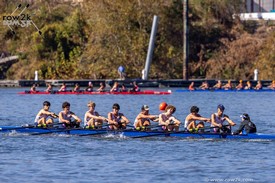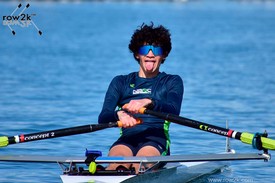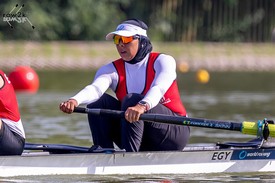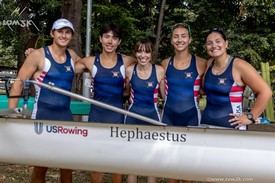Chapter Five: Big Bad Erg
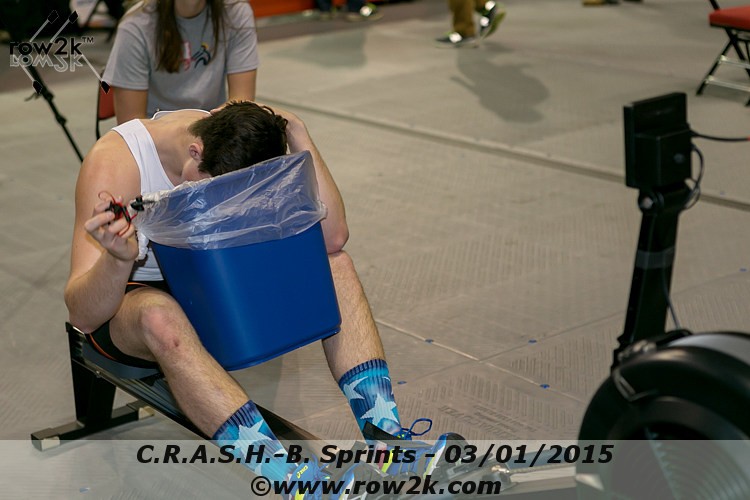
How can winter training be anything but hell?
After all, when you take an oarsman off the water and place him on a rowing machine, it has much the same effect as removing a fish from its natural habitat. In both cases, the life form in question starts to flop around spasmodically, and then it generally begins to smell.
Most of the guys on the Trinity team washed their workout clothes only once in a while, trying to get the most mileage out of each shirt, pair of shorts, or sweatshirt. While outdoors, the punishing odor of a twice- or thrice-used article of clothing can be effectively dispersed by moving air, but within the confines of a gym, the atmosphere is much less forgiving.
There was one particular guy on our team who often smelled seriously overripe, and because of this (and other reasons), he was given the nickname "Porgy." This nom de plume had nothing to do with the popular musical by Ira and George Gershwin, but was based instead on a type of fish, also known as a sea bream - good tasting, but not particularly attractive or sought after by game fishermen.
Scott Sparks, Porgy's real name, was short and stout and possessed many of the physical characteristics of that aquatic creature, described by Wikipedia as a "deep-bodied compressed fish with a small mouth separated by a broad space from the eye." The nickname, in fact, fit him rather perfectly, and he accepted it with good humor. Yet because Scott was such a likeable guy, none of us had the heart to tell him the true meaning of this moniker, but instead led him to believe that it came from the main character of "Porgy and Bess."
Every deception has its downside, of course, and this one was no exception. After demonstrating his considerable bench-pressing abilities in the weight room, Scott often beat his chest like Tarzan and then broke into song, belting out the verse: "OH BESS, YOU ARE MY WOMAN NOW!" We quickly grew to despise the verse, until one day he sang it during our change of guard with the women's team, which by rare coincidence had a member named Bessie McDonald.
Bessie blushed, as did Scott. Our afternoon was complete.
*
After weights, of course, we still had to do some technical work in the indoor rowing tanks, and then each take our turn on the Gamut erg.
I personally loved the tanks, for it was here that Coach Poole was able to point out the main deficiencies in my stroke. I, in turn, was able to remedy these errors by cross-referencing myself in the two mirrors. I confess to developing a certain amount of obsessive behavior here; I had made it my goal to become the most proficient oar on the team, knowing I would never be the strongest.
This quest for technical excellence may have cultivated a little vanity as well, induced by gazing into the tank mirrors too much. But if this was the case, I was largely unaware of it. To be honest, most male athletes are as vain as they are smelly, but from a practical standpoint, some amount of self-appreciation is as natural and necessary as body odor - and it is only those in close proximity that must suffer.
Many crew programs have now done away with indoor tanks, which are expensive and messy in their own right, but I think this is unfortunate. Not only is it good to admire oneself to some degree, if it provides the motivation to work hard, but more importantly, perfecting one's rowing form is arguably as important as learning to pull hard.
Which brings us to the Gamut erg - the one winter training apparatus that I am not sad to see fade from popularity. We had a nickname for it - the vomit-o-meter.

The Gamut ergometer was a primordial objet d'art, something that might eventually find its way onto the set of a steam punk film. It looked like a big metal monster that had been created one weekend by an engineer in his garage, just for kicks, using welding tools and various bits and pieces that just happened to be lying about, like a cheap bicycle tachometer and an oversized clock repurposed from a photographer's developing room.
The only clue that the machine involved rowing at all was the sawed-off end piece of a wooden sweep oar. This protruded from a square metal sleeve, which linked it to a spring-loaded metal armature, suspended below the seat deck. When you pulled on the oar handle, the metal armature moved in tandem underneath you, pulling on a cable and making a distinctive "twacking" noise at the completion of every stroke.
The cable in turn spun a heavy, horizontal gyro made of cast iron, whose revolutions were recorded by the tachometer and the mileage counter. The former gave you a rough idea of your relative speed, the latter racked up points that ultimately ranked you among your peers. Maximum points within a designated period of time were what you were shooting for, and the big clock was set manually, by positioning the minute hand and then clicking the "on" button.
Unlike the ergometers of today, the Gamut erg also had a unique way of accounting for - and handicapping - different-sized oarsmen. A simple disk brake ran along the inside of the metal cylinder, to which a string and then a small "basket" were attached. The more weight you put in the "basket," the more the brake would hinder the spinning gyro.
Heavier guys and gals had to row with more resistance, in order to equalize everyone's efforts based on body mass. It was an imperfect system, of course, as was the release mechanism of the stroke, because the oar handle often slammed violently into your chest. But it was a system nonetheless, and to my knowledge no one ever bothered to make any serious refinements to the machine over the years.
Oarsman dreaded their encounters with the Gamut, perhaps more than they do the CII today, because the machine had an indomitable presence. It was like a mechanical bull that you agreed to challenge, but soon regretted the decision. With the first few pulls of the oar handle, the entire device began to creak like a metal beast that did not want to be awakened. And once it started, you could not get off until you were queasy, weak-kneed, and defeated.
We were introduced to the Gamut on the very same day that Porgy sang his love song to Bessie McDonald. Our good humor quickly faded as we gathered round to watch the final painful moments of a varsity heavyweight oarsman completing a 10-minute test.
"Uh-oh, look out. He's gonna hurl!" cried Mongo, who was standing on the sidelines.
The upperclassman got off the erg and stumbled forward, like a wounded animal, unsteady on his legs. Then suddenly he doubled over and tried to vomit, but nothing came out - only a thick wad of spit dangled from his open mouth.
"Christ, it's only the dry heaves!" Jowurski said, visibly disappointed with his teammate's performance.
"You guys should've seen the chick that just left," he said to us. "She pissed all over herself."
We looked at each other and then at the floor around the erg, searching for signs that this might be true. There were in fact small puddles around the base, but we assumed that these were created by sweat.
"Damn," he said. "You freshmen will probably shit your pants. Better put on your diapers!"
Mongo laughed and hobbled away. He had an odd, bow-legged stride, which lent a somewhat simian aspect.
And that was our introduction to the vomit-o-meter.
Truth be told, the Gamut erg was really built for people like Jowurski and not the tiny guys on our lightweight squad, who Mongo would eventually dub "the little licker gang."
Most of us could only handle three to four lbs in the basket, since our boat average was under 150 lbs. Nevertheless, Coach Poole gave us each a turn, beginning with the two guys who had rowed before, Peter Tyson and Richard Malabre. They were the only true lightweights among us, weighing in at roughly 160 lbs, and they executed the 6 x 2 minute pieces with poise and dignity, but coughed with exhaustion at the end of their efforts.
I had serious doubts when it came my turn: Even after rowing all fall and lifting weights, I still only topped off at 140.
"Now, Dan, just see what you can do and don't worry about the numbers," Charlie suggested, removing some weight from the basket. "And remember not to throw your shoulders at the catch."
I grabbed the massive handle with my inboard hand and slowly drew it toward me. Then Coach Poole set the clock.
"Ready all, row!" he said.
Unlike the others, I went out steady, which was always the way that I'd ran cross-country races back in high school. I was a pacer, saving my best effort for the closing sprint.
"Good, really good," Charlie said, when I'd finished the first one. "Now let's see if you can do even better - just let loose a little and see what happens."
As if on command, I scored higher on my next piece, and on every piece after that. Instead of flagging, I simply grew stronger and stronger, harnessing the wave of optimism created by my coach. It sounds corny, but Poole had a way of instilling positive energy and self-confidence in such a way that you really wanted to make him proud and happy. When the look of excitement came over his face, it was infectious and inspiring.
Afterwards, my arms and legs felt like cooked spaghetti, and my mouth was bone dry, but I stepped off the Gamut and walked away, feeling like I'd just ridden on the back of a dragon. I felt taller, somehow. My scores were not the best, but they were right behind Tyson and Malabre, both of whom were bigger and more experienced than me.
If this were a novel and not a true story, now would be the perfect moment to describe how I channeled anger into those erg pieces, using resentment and hatred toward my old enemies as a way to drive myself. But in fact I did no such thing. With Coach Poole by my side, there was no room for hatred in my heart, which was instead filled with the hope of infinite possibility.
I mention all of this because there are many coaches at the top level of rowing who choose to motivate their athletes in this way - using anger, hatred, fear, and the threat of punishment as the dark tools of their trade. Years later, when I started coaching myself, I would meet some of these men and women, many of whom were celebrated as the best in their field due to the results they produced. What is seldom measured, of course, is the long-term impact they have on the young lives they led; not only the physical injuries, but also those that lie deeper.
What Poole passed along was something much different.
When we'd all finished our pieces, Coach Poole had a special announcement.
"Next week we will formally go into training," he said. "Which means, no one can touch a drop of alcohol until after the Dad Vails."
A collective moan issued from the group, for keg parties were a way of life on campus.
"But," he continued, "I have a special treat for you. To celebrate the start of winter training and the sobriety rules, tonight I'm going to take you all out to the Nutshell."
We all cheered, as the Nutshell was our favorite pub.
"Also, a few of my old teammates are coming into town - and it's kind of a Trinity tradition for the alums to go out drinking with you and tell you stories about the old days."
I confess that I don't remember much from that evening, perhaps because of the amount of beer we consumed. I do remember meeting up with one of Charlie Poole's teammates—a friendly giant named Harry Graves, who showed up at the boathouse in his Naval whites and escorted us to the pub. (Graves would later become father of three outstanding Trinity oarsmen - Peter, John, and Tom, all of whom were Olympic-level athletes.)
I've never been much of a drinker, but Charlie's old pals kept plying us with pitchers. Needless to say, when I stumbled back to my dorm, I couldn't remember the door code and ended up having to throw sticks at my window to wake up my roommate.
"What's up with you," Jim asked, sleepy-headed.
I shook my head, disoriented, and tried to speak.
"We did some erg pieces, and then we went out for beers, and..."
Suddenly I leaned over and vomited into a trash barrel.
"I don't think I ever want to drink again," I mumbled.
"Okay, buddy," he said. "Time for bed. And let's put you on the bottom bunk tonight."
If you enjoy and rely on row2k, we need your help to be able to keep doing all this. Though row2k sometimes looks like a big, outside-funded operation, it mainly runs on enthusiasm and grit. Help us keep it coming, thank you! Learn more.
Comments | Log in to comment |
There are no Comments yet
| |
- Bont Rowing
- Calm Waters Rowing
- Concept 2
- Craftsbury Sculling
- The Crew Classic
- CrewLAB
- Croker
- Durham Boat Co.
- Empacher
- Faster Masters
- Filippi
- Fluidesign
- h2row.net
- HUDSON
- Live2Row Studios
- Nielsen-Kellerman
- Oak Ridge RA
- Peinert Boat Works
- Pocock Racing Shells
- Race1 USA
- RowKraft
- Rubini Jewelers
- Vespoli USA
- WinTech Racing
- Bont Rowing
- Calm Waters Rowing
- Concept 2
- Craftsbury Sculling
- The Crew Classic
- CrewLAB
- Croker
- Durham Boat Co.
- Empacher
- Faster Masters
- Filippi
- Fluidesign
- h2row.net
- HUDSON
- Live2Row Studios
- Nielsen-Kellerman
- Oak Ridge RA
- Peinert Boat Works
- Pocock Racing Shells
- Race1 USA
- RowKraft
- Rubini Jewelers
- Vespoli USA
- WinTech Racing






